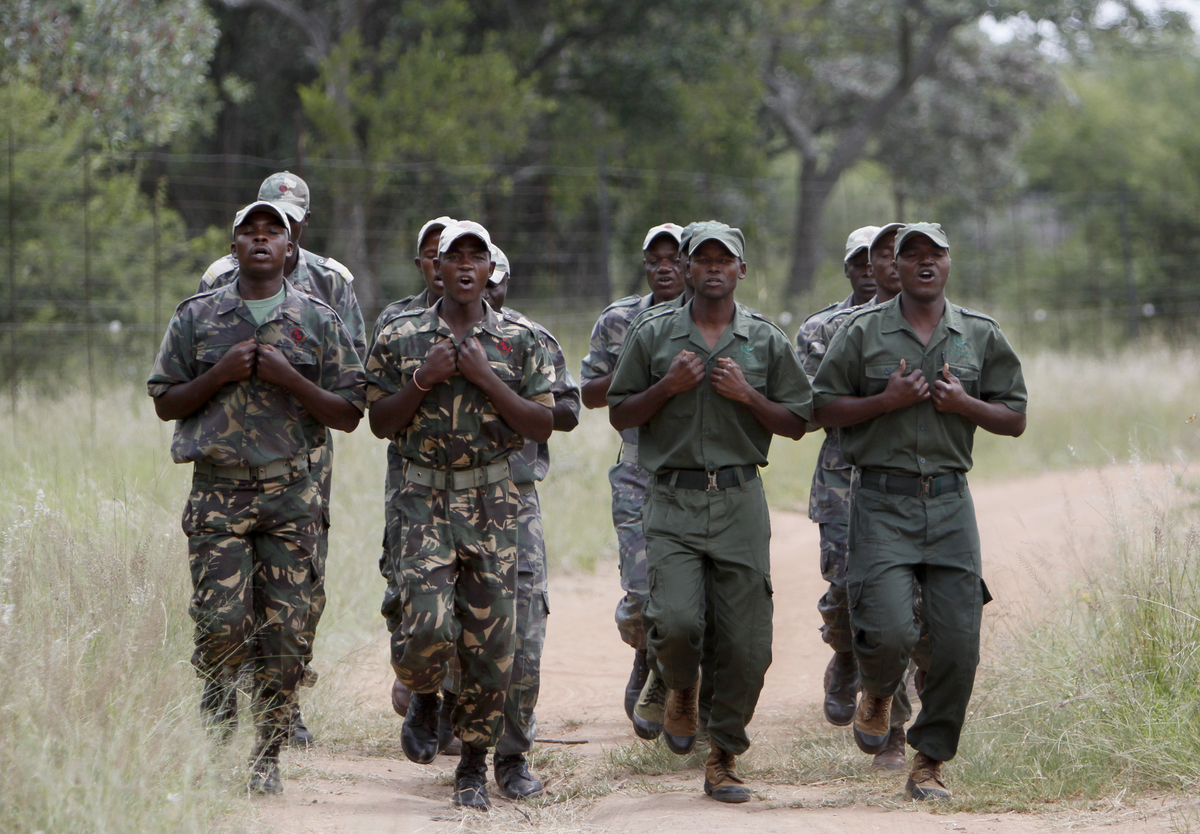Press Release
FOR IMMEDIATE RELEASE
April 22, 2013
For more information, contact:
Wayne Bisbee
wayne@BisbeesConservationFund.org
Lapalala Wilderness, South Africa

The first graduates walk out of Nkwe Tactical Training Academy Friday, April 26, as certified rhinoceros monitors with a better understanding of the warning signs of poaching activity. Most will go on to advanced classes where they’ll receive instruction in wildlife management, surveillance, crime scene investigation and small arms tactics in preparation for careers as field rangers. The new school is the cornerstone of PROJECT: SAVE THE RHINO, which is funded by the Bisbee Fish & Wildlife Conservation Fund. The academy is the first of its kind in South Africa.
“Rhino poaching has grown by 25 percent per year for the last four years, virtually doubling the losses since 2008,” says Wayne Bisbee, president of the Conservation Fund. “Poachers kill these threatened animals and cut off their horns to sell on the lucrative black market. By creating the NTTA, we’ll make the cost of getting those horns so high the poachers will go elsewhere. Deterrence is the key. We’ll be using the latest technology to train field rangers, and as an added benefit we are providing a viable career opportunity for local villagers and a positive economic impact to the region.”
When it reaches full capacity the academy will house and train 100 highly-qualified rangers each year with a comprehensive curriculum. The level of technical training and number of graduates is unprecedented and will have a lasting impact on anti-poaching efforts in South Africa. The paramilitary setting includes tent accommodations, foot lockers, a mess hall, shooting range and classrooms. Most of the hands-on training will be conducted in the rugged South African bush. The academy will be run by Simon Rood, who started the Nkwe (which means leopard in Afrikans) Wildlife & Security Services. With his former military background and long experience in wildlife security management, Rood is well-qualified to oversee the NTTA operation. Rood’s partner, Sergeant Major Boy John Mashabane, will be directly in charge of recruit training. Mashabane is another military veteran who spent 12 years working in Kruger Park with Jack Greeff, a well-known anti-poaching advocate.
“The training involves hardship, long hours, tough discipline and demanding physical requirements,” Rood explains. “It’s much more challenging than what meets the eye. But these dedicated and highly-motivated rangers are the champions in the rhino anti-poaching operations. We have not lost a single rhino to poaching since we started these tactical patrols and with the academy’s technological capabilities we’ll have an even stronger security presence.”
There are several phases in the academy curriculum. Any employee of a privately-owned reserve can take the short Rhino Monitor course to increase awareness of poaching activity and what to do when it is encountered. Field ranger recruits are screened and then trained extensively for six months. Upon successful completion, they receive government-recognized certification and go on to advance training in tactics and leadership. Thanks to Conservation Fund donations, recruits will receive state-of-the-art technical training and support.
“The academy will be among the first in the world to use the SMART software system, which was developed by a multi-group non-profit consortium. This new data base system [smartconservationsoftware.org] will help measure, evaluate and improve the effectiveness of the wildlife patrols and conservation efforts,” Bisbee says. “We bought a system and the programmers will be on site training our staff how to use it. Our goal is to eventually provide SMART training to others, expand its overall capability and help spread this cutting-edge technology across the continent.”
Advanced recruits will also receive training on Laser Shot, a firearms simulator that will be the first privately-operated system in South Africa [lasershot.com]. Used by all branches of the military and law enforcement agencies throughout the United States, this realistic simulator will teach recruits marksmanship and target recognition before they are actually exposed to dangerous situations. Software is being developed to provide interactive training solutions tailored especially for conditions encountered in the remote South African bush.
Aerial surveillance and support capabilities are being added to aid in the fight. A light helicopter and unmanned drones with infrared and thermal cameras will be able to detect rhino poachers in remote areas and rapidly deploy rangers in response. The helicopter will be the first owned by a private anti-poaching unit and will enable quick response and medevac capabilities.
“The academy will be turning out field rangers of the highest caliber,” Bisbee says. “It’s our task to provide the organization and funding levels to bring the fight to the poachers and stop this senseless slaughter. With our commitment, the regional coverage on NWSS private reserves will increase by 50 percent.”
To learn more about rhinoceros poaching in South Africa, make a donation or volunteer, please visit www.BisbeesConservationFund.org.